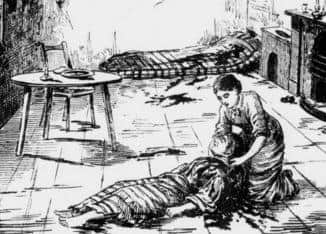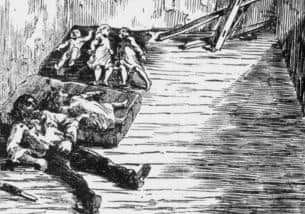Have YOU heard of Sheffield's 'White Croft' murders - where a 'depressed' hawker murdered his wife and four children in 1884?
and live on Freeview channel 276
Joseph Laycock had lived with his wife Maria in Court 2, White Croft, at the time of the murders in July, 1884.
He is described by one newspaper account as being ‘idle and dissolute’ but, reading between the lines, he was probably suffering from mental health issues after being forced into military service, and due to his heavy drinking.
Advertisement
Hide AdAdvertisement
Hide AdAccording to a report from the Times newspaper on July 11, 1884, Laycock and Maria had been drinking in a Sheffield pub before returning home.


During the night, neighbours heard an horrific scream, and the sound of someone pacing around the rooms.
The report states that months before, Laycock had been forced to join the militia and, following his return, had got himself into trouble with the police again - possibly for an assault on his wife - and had been jailed for three weeks.
When neighbours went to investigate the following day they found Maria Laycock “with her head almost severed from her shoulders” on the floor, and her husband laying behind the door with his own throat slit and in a critical condition.


Advertisement
Hide AdAdvertisement
Hide AdAt first they thought the children - Sarah, Frank, Mary and Joseph, aged between two and eight, were all safe - but when police arrived, they discovered their bodies in two beds upstairs.
Laycock pleaded with one officer, who were well-known to each other, to let him die, after cutting his own throat.
But he was taken to hospital and slowly recovered from his wounds. He was still in hospital a week later when his family were buried in a single grave at Intake Cemetery - attended by an estimated 25,000 people - but did appear “looking exceedingly pale and weak” at the inquest a week later.
A report from the hearing states: “Evidence was given that the night before the murders, Laycock had asked his wife to drink. She refused and he replied, “You might as well get drunk tonight while you have the chance. She said: “I tell you, I don’t want,” and he answered: “It might be the last time you’ll have say.”
Advertisement
Hide AdAdvertisement
Hide AdAt his trial at Leeds Assizes in August of 1884, defence witnesses for the 34-year-old said that Laycock had been suffering from depression at the time of the burgers.
The doctor who first examined him when he was admitted to hospital said he had been suffering from “extreme mental depression”, and his sister Elizabeth Platts told the court that he has seemed “lost” and did not seem “right in his mind”, when he visited her at her shop on June 11.
Other hawkers from the city also said that Laycock had appeared in a distressed state in the days before the killing. But he was found guilty and sentenced to death.
He was hanged at Armley Prison later in August, 1884, his last words reportedly being: “Oh my children, my children. Lord have mercy on my children.”